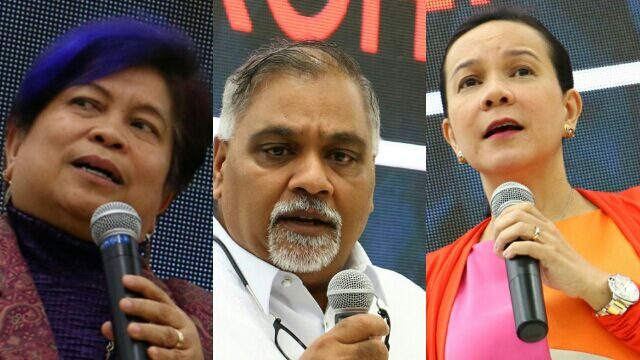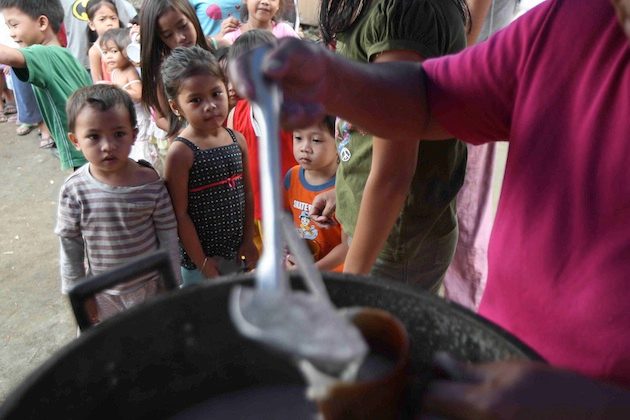SUMMARY
This is AI generated summarization, which may have errors. For context, always refer to the full article.

MANILA, Philippines – Can hunger be solved?
The World Food Programme (WFP) emphasized that hunger is the world’s “most solvable problem”, but it doesn’t happen overnight.
It’s not easy, according to Senator Grace Poe, but it can be done.
“To arrive at food security, a lot of things have to be done,” she said in a forum entitled, “Aiming for #ZeroHunger” organized by Rappler, the Department of Social Welfare and Development (DSWD), and the WFP on Friday, November 14.
DSWD Secretary Corazon Juliano-Soliman said that putting an end to hunger and malnutrition can only be fast-tracked if every Filipino does his part regardless of how small or big. “It takes all of us to solve hunger,” she emphasized. “Any human being who cannot sleep because you see a child sleeping in the streets, you can do something.”
Improving the system
Eliminating hunger in our lifetime requires comprehensive efforts.
#ZeroHunger is not achieved just by putting food on the table; it demands improving systems in the country. The Zero Hunger Challenge of WFP seeks to address these issues by aiming for the following:
- No stunted children under two years old
- Adequate access to food throughout the year
- Sustainable food systems
- Improving the productivity of small-scale workers
- No food wastage
A recent Social Weather Stations poll also found that 43% or an estimated 9.3 million families consider themselves food-poor or unable to feed themselves the right quality and quantity of food. (READ: More Filipinos consider themselves poor – poll)
“Food and nutrition security is not just about production,” WFP Country Director Praveen Agrawal said. “It is about access. Do we have financial, economic, and physical access to food?”
There are regions that produce enough food – especially in agricultural areas – but they do not have enough to eat. (READ: Plenty of food, little nutrition in Benguet)
Meanwhile, fisherfolk and farmers, the country’s top food producers, are among the poorest in the Philippines. The effects of climate change add to the existing prevalence of poverty in the sector. (READ: Empowering farmers against climate change)
“Hunger is not just the absence of food but also the insecurity of where you will get your food next,” Soliman explained. “Primary goal is to reduce hunger by making sure poverty is a thing of the past.”

If we reduce malnutrition even by just 1%, according to Agrawal, poverty can be reduced by 4%. The malnourished of today will be the poor of tomorrow if these are not addressed.
Non-governmental organizations (NGOs) play a big part as they also call the attention of those who are in a position to do something to communities in need of help.
“NGOs, you have the ear to the ground, you have the ear to the people,” Agrawal said. “You know what their needs are and these needs are not unanswerable.”
Collaboration is important
The government should be at the forefront of helping the hungry and malnourished in the Philippines: legislation responds to what is articulated as needs of the poor while the executive handles the proper policies that can alleviate their situation.
Through proper collaboration among the different branches of the government, the appropriate response can be crafted. “We need to ensure that there is political will and when there is a will, there’s got to be a commitment,” Agrawal emphasized. “In that commitment, we need to see that these are reflected in the policies.”
The programs of the government should be institutionalized and be handled well by those who will implement them – free from corruption and the prying eyes of those who seek to prioritize other less important things.
These should not end just because of administrative changes, which happens too often. “We need to institutionalize programs that address the hunger issue,” Poe said. “Let’s think of this as an investment, not just a subsidy,” she added.
Place for all
At the end of the day, the fight against hunger and malnutrition isn’t limited to those in power or even just government.
If every citizen does something in his or her own community, achieving #zerohunger will not take more than one generation.
“We can solve and we must solve it if we wish to have a healthy, productive, and global community,” Agrawal stressed. “We need to be part of the process.” – Rappler.com
In case you missed the event, you can watch it here and read the liveblog. If you want more information on #ProjectHunger, email move.ph@rappler.com and sign up to be a part of the #HungerProject community.
Add a comment
How does this make you feel?
There are no comments yet. Add your comment to start the conversation.